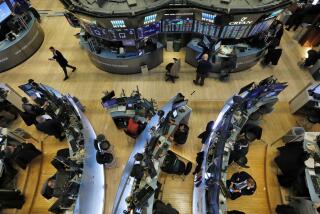IMPACT OF THE GULF WAR : Economic Battle Lines Not Yet Drawn
- Share via
The U.S. economy, burdened for months by Middle East turmoil, could be affected deeply--and in ways not often recognized--by the course of the Persian Gulf War in the coming days.
Many economists agree that an Iraqi withdrawal would cheer consumers and business executives, perhaps boosting spending and investment at a time when the slumping economy needs the help badly. A quick ground war ending in U.S. victory could yield similar benefits.
Yet there are less clear-cut outcomes that might arise from the crucial decisions now facing President Bush and Saddam Hussein:
A diplomatic settlement that preserves the Iraqi war machine and allows Hussein to keep power could lead to an American military commitment in the Gulf--and a financial burden for U.S. taxpayers--that lasts for years.
In the long run, “Peace could be more costly in terms of spending than an outright victory, in which we remove Saddam Hussein from power and demilitarize Iraq,” said Brian R. Horrigan, director of long-term forecasting at the WEFA Group in Bala Cynwyd, Pa.
There also are important short-term implications for the U.S. economy, as the Persian Gulf War now reaches a crossroads between peace and an escalating ground battle.
Consumer confidence has taken a historic battering in the months after Iraq’s invasion of Kuwait, as oil prices rose along with public fears about the crisis. The confidence level, as measured by the Conference Board in New York, has sunk to its lowest level since the recession year of 1982.
A settlement in the near future would boost public spirits and be reflected, to some degree, in higher spending and investment, analysts say. It may also create business for U.S. companies helping to rebuild Kuwait.
But serious questions remain about how powerful the effect would be at a time when the nation’s economic problems are varied and widespread.
“If the war ended tomorrow, people would be celebrating--but they’d drink cheap champagne, because they’re feeling frugal,” said Jason D. Bram, a Conference Board economist. “They still perceive there’s a weak economy.”
A breakdown in diplomatic efforts and a ground war could have an entirely different meaning for the economy than a quick Iraqi withdrawal from Kuwait.
A ground war, depending on its duration, would dampen public confidence and put more pressure on the U.S. budget deficit as the military restocks its arsenal. But the process could also mean a jump in orders for a whole range of companies that are supplying the vast allied military effort.
In the last three months of 1990, for instance, U.S. military purchases rose by $12 billion, largely to supply Operation Desert Shield, said Cynthia Latta, an economist with DRI-McGraw Hill in Lexington, Mass. The magnitude of such orders could double during the first quarter of 1991, even without a major ground war.
“The immediate impact (of continued fighting) is orders for companies that make . . . uniforms, gas masks and filters to keep out the sand,” she said.
If U.S. defense outlays jump significantly to pay for a ground war, a separate economic effect could gradually be felt that might postpone the end of the recession--upward pressure on interest rates caused by increased government borrowing to finance the budget deficit.
“For the economy to revive, private-sector borrowing has to pick up--and if the federal government is this huge hog at the trough, long-term interest rates are going to rise,” warned Bruce Steinberg, an economist at the Merrill Lynch investment firm in New York.
The day of recovery is likely to come later this year, most economists maintain. However, the war will not be the only factor affecting the timing, analysts say.
Such problems as fragility in the banking system, debt burdens that run throughout U.S. society and the anemic pace of construction all have roots predating Iraq’s invasion of Kuwait, the argument goes. And their resolution will not be dictated by the war’s outcome.
Recent indicators pointing to weakness in employment, construction and other economic activity back up the view that the war is just one of several factors influencing the downturn.
That in mind, one private economist predicted a “double-dip” recession, in which the economy rallies upon word of a Middle East settlement, but sinks back down after the initial glow fades.
“The euphoria immediately after the war probably will pick up the economy temporarily,” said Sung Won Sohn, chief economist with Norwest Corp. in Minneapolis. “But the reason we’re in a recession right now is not because of Saddam Hussein. It’s because of too much debt by consumers, corporations and the U.S. government.”
Steinberg of Merrill Lynch pointed out that extraordinarily bleak consumer attitudes arise from growing unemployment and other financial factors. Sluggish spending by consumers, in other words, is not simply a matter of war anxiety.
“You can have people relaxed about the war being over and still not run out to go shopping,” he said.
Beyond short-term forecasts about the war’s economic effects lie longer-term concerns about its ultimate cost to the nation.
A prompt settlement in which Hussein holds onto power could lead to political instability in the Middle East for years--and a lengthy military commitment by the United States in the region, some say. While such a commitment would mean added business for U.S. defense contractors, the pressure on the U.S. budget could ultimately force a tax increase, WEFA’s Horrigan said.
More to Read
Sign up for Essential California
The most important California stories and recommendations in your inbox every morning.
You may occasionally receive promotional content from the Los Angeles Times.










